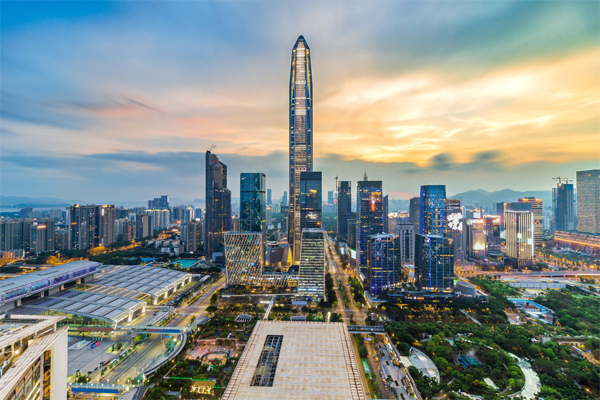Guangdong ready to set up global bank and futures exchange center

Skyscrapers border a lush green landscape in Shenzhen's central business district. [Photo provided to chinadaily.com.cn]
Guangdong province, an economic powerhouse in South China, is prepared to set up an international commercial bank this year to improve the modern financial system in the Guangdong-Hong Kong-Macao Greater Bay Area, according to a senior government official.
In a government work report delivered to the annual provincial legislative meeting on Thursday, Wang Weizhong, acting governor of Guangdong, said the province will also build a futures exchange center and support the Shenzhen Stock Exchange to implement reform of a whole-market registration system.
Additionally, a science and innovation financial reform pilot zone will be created between Shenzhen and Guangzhou – the provincial capital – Wang said.
"We will deepen reform of green finance, promote construction of financing platforms for small and medium-sized enterprises and improve the level of financial services for the real economy," he added.
The province will also consider construction of a cross-border financial and asset management center to expand financial cooperation between Hong Kong, Macao and Guangdong.
An after-sales service center for the insurance sector will also be established, the acting governor said.
Establishment of the international commercial bank and cross-border financial service platforms is part of measures to accelerate construction of the GBA, he added.
The GBA, which comprises nine cities in Guangdong province and the Hong Kong and Macao special administrative regions, has a total population of more than 86 million.
Located at the intersection of internal and external circulations, Guangdong has a complete industrial system, strong innovation strengths and a sound business environment, with more than 15 million market players, 70 million workers and 127 million permanent residents, Wang said.
The province greatly benefits from major national development strategies, including construction of the GBA, the Shenzhen pilot demonstration zone and two cooperation zones with Hong Kong and Macao in Shenzhen's Qianhai and Zhuhai's Hengqin areas.
"This is where we have advantages and confidence to forge ahead in the coming years," he said.
Guangdong's GDP increased 8 percent year-on-year to 12.4 trillion yuan ($1.95 trillion) in 2021, according to the government work report. Its economy is set to grow by about 5.5 percent year-on-year, with its imports and exports predicted to increase by 3 percent, in 2022.
"A series of rules and a business mechanism between Guangdong and the two special administrative regions were strengthened in the past years," Wang said.
For example, a business pilot project for cross-border financial connections and a law practice authentication system were successfully launched in Guangdong last year.
"We will expand the connection of commercial systems, enhance mutual recognition of professional qualifications and promote standards and rules related to other fields to support Hong Kong and Macao to better integrate into the overall development of the GBA," he added.



 Print
Print Mail
Mail

